Trump inherits a relationship between friends whose geopolitical and even parochial Jewish narratives have been displaying increasing divergence, writes Shalom Lipner. While the bedrock values common to both Israel and the United States are intact, a bewildering international environment has exposed differences of outlook. This piece originally appeared in The Atlantic.
Some international relationships, as White House Press Secretary Josh Earnest pronounced in July, transcend “any single personality.” Given the overtly tenuous chemistry between U.S. President Barack Obama and Israeli Prime Minister Benjamin Netanyahu, that’s been a fortunate thing for enthusiasts of the U.S.-Israel bilateral relationship; I posit this as one such enthusiast, who just spent two and a half decades working in the prime minister’s office in Jerusalem. Netanyahu has indicated he may expect a more sympathetic ear in the White House come January 20, telling “60 Minutes” that Donald Trump’s “support for Israel is clear.” The president-elect’s nomination of David Friedman—described as a “key force behind the incoming president’s relatively hard-line pro-Israel positions”—as ambassador to Israel underscores Netanyahu’s grounds for hope, if also accentuating deep tensions between competing visions of Israel’s future, both here and in the United States.
Since President Harry Truman conferred American recognition of Israel’s independence just 11 minutes after its formal declaration, the links between Israelis and Americans have grown to encompass diverse fields such as space exploration, alternative energy and water desalination, cybersecurity, and television and film. It is no coincidence that more than 70 percent of Americans maintain a favorable opinion of Israel, and over 80 percent of Israelis feel similarly about the U.S. Over the years, I’ve witnessed the rapport personally in multiple venues: hosting and visiting with administration officials and members of Congress, sailing aboard a U.S. Navy destroyer during a search-and-rescue exercise in the Mediterranean, and working with American colleagues in places far afield such as Stockholm and Almaty to promote the mutual interests of both countries. No less critical has been the dialogue between the governments in the aftermath of what was once called the Arab Spring, but which many in Israel flagged as deteriorating into an Islamic winter.
Trump inherits a relationship between friends whose geopolitical and even parochial Jewish narratives have been displaying increasing divergence.
Yet Trump inherits a relationship between friends whose geopolitical and even parochial Jewish narratives have been displaying increasing divergence. While the bedrock values common to both Israel and the United States are intact, a bewildering international environment—including Russian adventurism, the Turkish crackdown, and the Syrian civil war and refugee crisis—has exposed differences of outlook. And despite similar democratic ideals expressed in both the U.S. Constitution and Israel’s Declaration of Independence, leaders in Jerusalem and Washington have appeared in recent years to be travelling different routes to the same destination.
Obama attempted to tackle a rapidly changing world with a sense of transformational zeal both at home and abroad. From the passage of the Affordable Care Act and the embrace of same-sex marriage domestically, to the reconciliation with Cuba and the publicly expressed hope for a future “world without nuclear weapons” overseas, the American president was willing to abandon convention even to the point of what some critics viewed as heresy. And cognizant of battle fatigue among the U.S. public and the strain its wars put on the country’s finances, Obama repositioned American policy in the Middle East as well, drawing down forces in Iraq and Afghanistan, backing away from his original push for Syria’s Bashar Assad to resign, and forging a nuclear deal with Iran. Particularly in the Cuba and Iran cases, the president adopted a high-risk, high-return strategy to engage some of the world’s enfants terribles with the declared goal of improving America’s position—while also exuding a certain impatience for those less audacious than he.
Meanwhile, Israel has hunkered down in its proximity to a regional meltdown. From here, as Secretary of State John Kerry and Iranian Foreign Minister Mohammad Zarif established a friendly rapport, “transformation” seemed to augur a realignment that could distance the United States from its traditional allies. To the overwhelming majority of my colleagues in the Israeli government, the negotiations with Iran seemed poised to both rehabilitate the world’s most prolific state sponsor of international terrorism through the removal of sanctions, and clear a path to its uncontested acquisition of an ominous nuclear capability once the deal expired. The government’s principal concern was, and remains, that optimistic, partial solutions to the challenge of an emboldened and potently weaponized Islamist movement will herald exponentially greater threats to the liberal West in the future. Netanyahu argued against lifting sanctions on Iran and has alluded to “various ways” the deal could still be undone.
Enter Trump, who is in many cases already tempering his unconventionally feisty rhetoric, sowing confusion and leaving his policy direction obscure. Trump’s campaign pledge to “dismantle the disastrous deal with Iran” has morphed, courtesy of one of his advisers, into “tak[ing] the agreement, review[ing] it, send[ing] it to Congress, demand[ing] from the Iranians to restore a few issues or change a few issues, and there will be a discussion.” When Trump surrogate Rudy Giuliani remarked that the U.S. “should reject the whole notion of a two-state solution in Israel,” he contributed to expectations that Trump would reduce the prominence on the American agenda of the Israeli-Palestinian peace process, long a priority of presidential administrations both Democrat and Republican. But these and similar remarks have collided with Trump’s admission that “that’s the ultimate deal [and], as a deal maker, I’d like to do … the deal that can’t be made” and talk of appointing his son-in-law as envoy to the region.
Dissonance permeates the discourse between Jewish communities in Israel and the United States.
Meanwhile, Friedman, the ambassador-designate and Trump’s personal attorney, has signaled that an attitudinal shift is indeed in the wings, likening supporters of the left-leaning J Street group—which was courted by the Obama administration—to “Jews who turned in their fellow Jews in the Nazi death camps,” calling them “smug advocates of Israel’s destruction.” He has also echoed Trump’s election promise to relocate the United States Embassy from Tel Aviv, where it has always been, to Jerusalem, Israel’s declared capital to which Palestinians also claim title; the Jerusalem Embassy Act of 1995 called for the embassy to be “established in Jerusalem no later than May 31, 1999,” but its implementation has been suspended repeatedly by presidents Bill Clinton, George W. Bush and Obama. Not surprisingly, the selection of Friedman has been the subject of some controversy, with Israel’s deputy foreign minister welcoming it as “good news for Israel,” while other quarters in the United States and Israel express concern that he “will not be an advocate for a two-state solution”—all raising the question of whether Trump will continue, or indeed break with core elements of longstanding American policy.
In fact, dissonance also permeates the discourse between Jewish communities in Israel and the United States, which are key arbiters of the relationship between the two countries. Jews in America vote overwhelmingly Democratic and mostly subscribe to liberal streams of Judaism; the state of Israel is not created in their ideological image. Employing a formal association between religion and state, Israel extends full recognition to only Orthodox Judaism, further alienating members of other denominations heavily represented in America, as fierce clashes between Orthodox and non-Orthodox worshipers over equal Jewish prayer rights at the Western Wall have demonstrated compellingly. Politically, some prominent American Jews have voiced their desire for Israel to make additional concessions to its Palestinian neighbors and, at times, their discomfort with certain Israeli security measures, such as the sometimes onerous inspections for concealed weapons at crossings into Israel.
Obama, as he made eminently clear when he addressed Washington’s Adas Israel congregation in 2015, assumed a personal stake in this debate. He weighed in bluntly, quoting the esteemed Jewish theologian Rabbi Abraham Joshua Heschel—who marched alongside Dr. Martin Luther King Jr. in Selma, Alabama back in March 1965—anchoring the fight for civil rights in the biblical imperative to not oppress the stranger, and asserting that “Jewish values” compelled him to consider the plight of Palestinian children in Ramallah.
From the vantage point of its government and much of its citizenry, however, Israel exists not as an abstract focal point for ancient dreams of Jewish autonomy, but as a tangible sovereign state. Many Israelis would thus retort, to the chagrin of the more romantically inclined, that the exigencies of national defense and coalition politics often require difficult and unsatisfying compromises. A consensus of Jewish Israelis yearns for diaspora Jews (and others) to identify with and support their country’s campaign to survive and flourish, but almost by definition, this exchange has been confined regrettably to the plane of deliberate instrumentality—with practical concerns taking precedence over intellectual ones—and not prophetic aspirations. This has translated into frustration when ultra-Orthodox political factions have stymied attempts to liberalize conversion and marriage statutes or when a security-conscious Israeli electorate has disregarded the sensibilities of some diaspora constituencies calling for bold peace initiatives.
Concomitantly, in a twist of historic proportions, America’s First Family will now include Jews of its own. Trump’s daughter Ivanka, her husband Jared, and their children affiliate with Modern Orthodoxy—a minority among American Jewry—whose political sentiments skew markedly more conservative than the majority of the Jewish community in the United States. (Jews favored Clinton over Trump by an almost three-to-one ratio.) While this may shift the White House toward greater appreciation of Israeli thinking on issues of religion and state, it will ironically widen the void between the dominant forces of contemporary Judaism: progressives in America and traditionalists in Israel, though of course neither country is monolithic.
This tangle is rendered thornier still by the vocal support for Trump among the neo-Nazi and other anti-Semitic sets, a disturbing turn of events that has proven divisive and polarizing within Jewish circles, where individuals and organizations are taking up competing positions—for instance, on the suitability of former Breitbart News executive chairman Steve Bannon to serve as chief strategist and senior counselor to the president. Those Israelis who have followed the debate, by the way, have largely lined up in this debate according to their own liberal or conservative political proclivities, while sharing the hope that all this ends up being “good for Israel.”
In the past, lapses in communication and disparities of assessment have produced discord between Israel and the United States concerning matters such as the wisdom of holding elections in Gaza, the most prudent response to political developments in Egypt, and the scope of religious freedom in Israel. Having witnessed my share of disagreements between Americans and Israelis—Secretary of State John Kerry’s recent impassioned comments on settlement construction being one example—I’m convinced that the U.S.-Israel relationship will only benefit from maximum candor. Although the public airing of these perceptual gaps has rarely generated results, bringing them cogently and discreetly to the surface is the baseline requirement for them to be addressed soberly and plausibly bridged. After all, the perennial first step to fixing any problem is realizing that you actually have one.
The Brookings Institution is committed to quality, independence, and impact.
We are supported by a diverse array of funders. In line with our values and policies, each Brookings publication represents the sole views of its author(s).

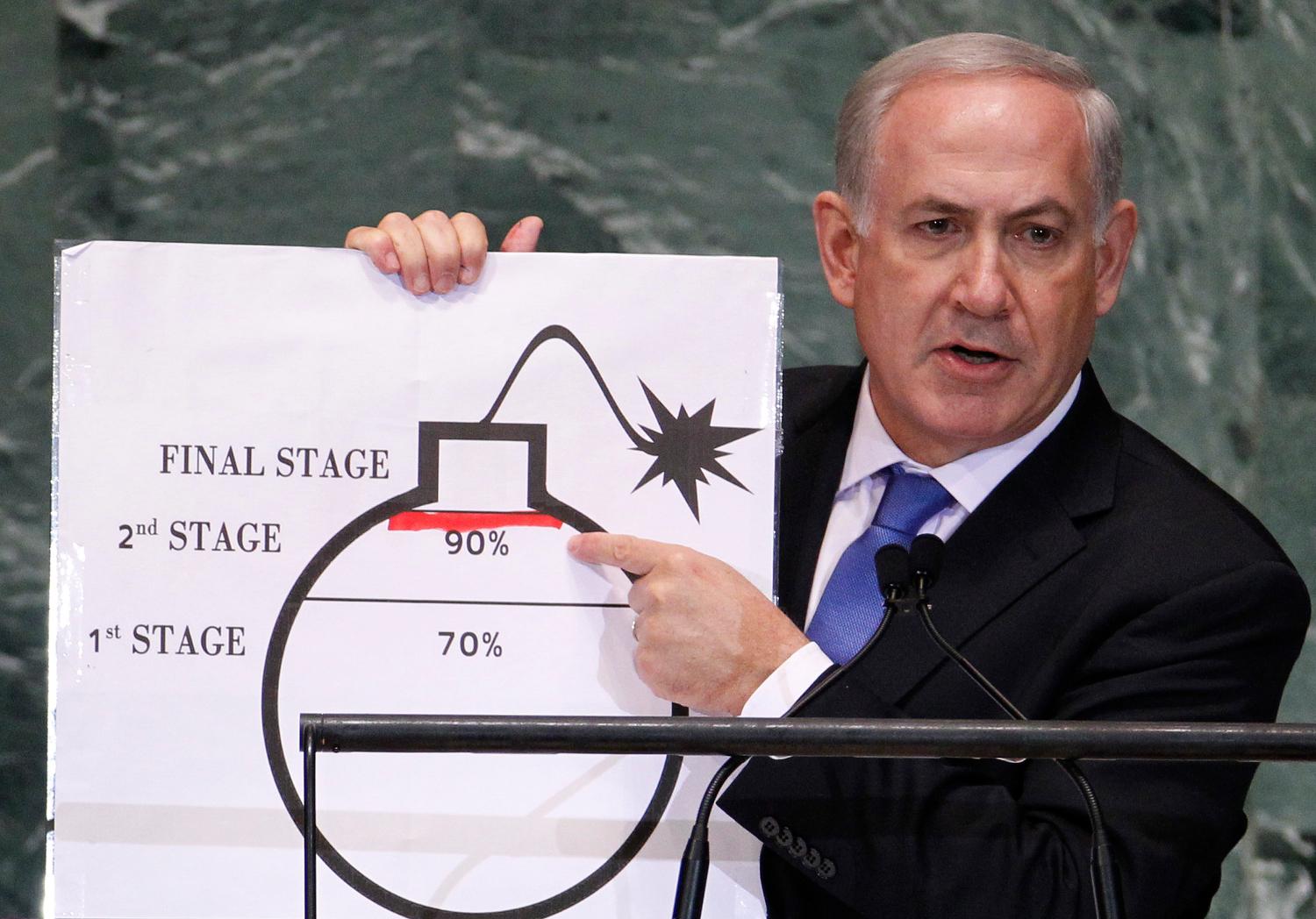


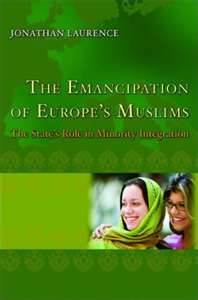
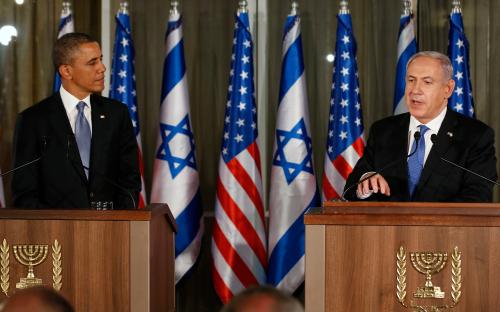
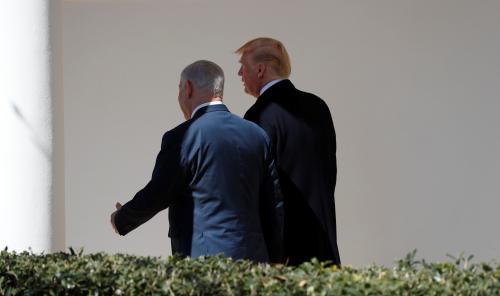

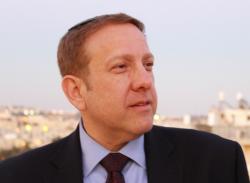



Commentary
Growing divergence in the U.S.-Israel relationship
December 20, 2016